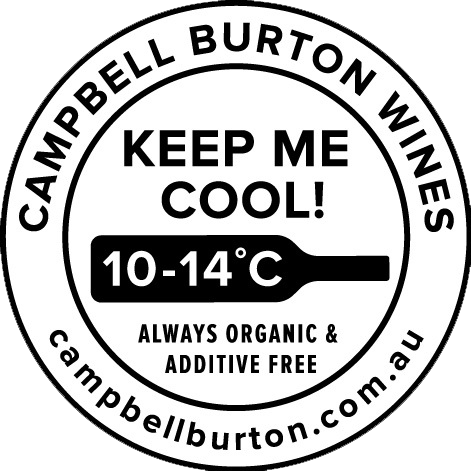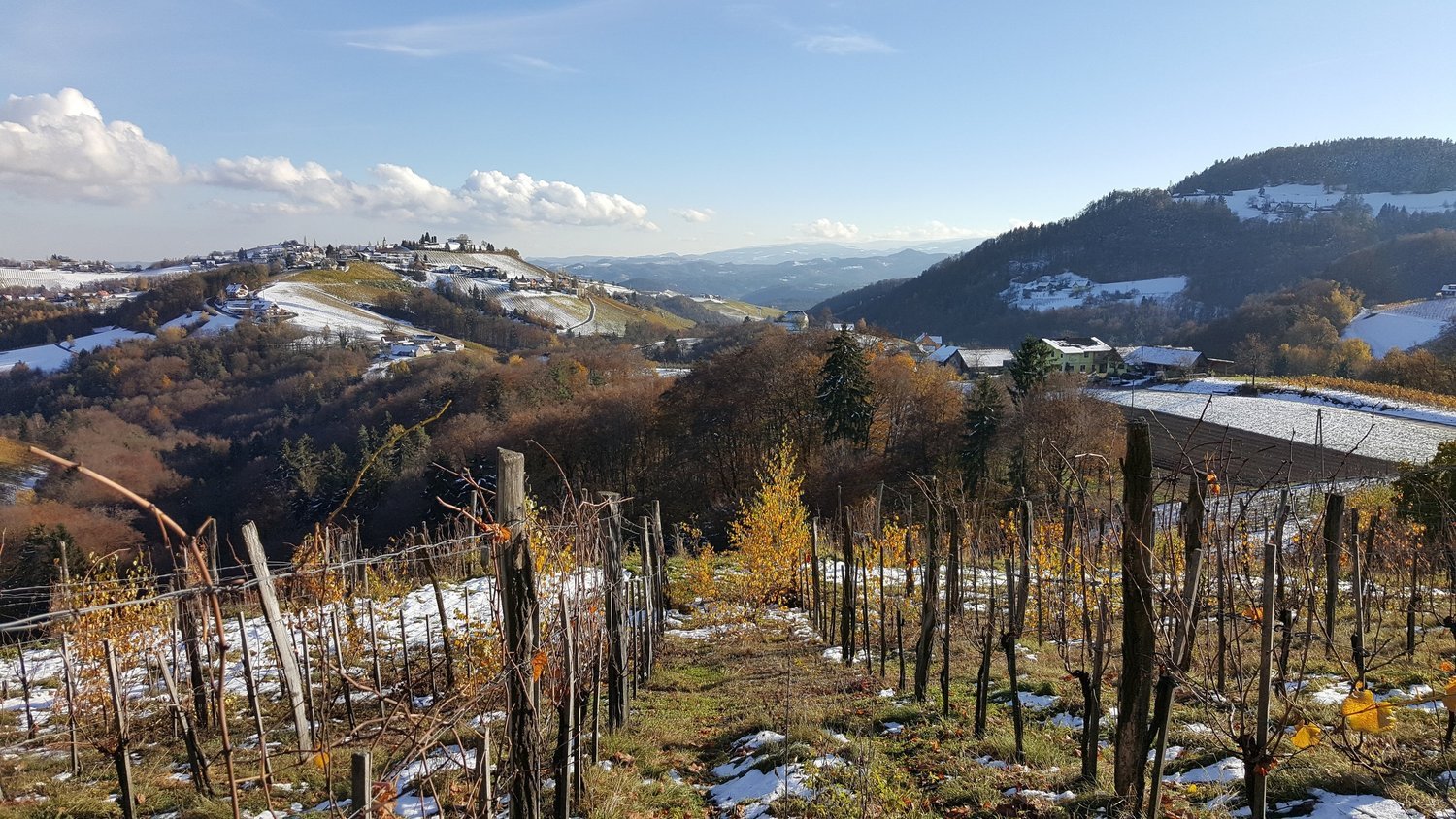Weingut Schnabel
Karl and Eva Schnabel farm 5 hectares of vines on the Sausal hill in Styria, in the south of Austria.
Karl grew up in this part of Styria and has worked with the land for most of his life. His family were involved in cattle farming and to this day he favours a closed circuit farming system and his small herd of cattle make up a fundamental part of the whole. To this day he and Eva and their three sons live in the home that belonged to Karl's grandparents and it still exudes the happy energy of its former days as an inn and dance hall.
He and Eva worked in Burgundy in 1997 and 1998 and their respective formal educations were taken in Vienna.
Since 2003 their vineyards have been certified biodynamic and since 2007 every wine that they produce is free of added sulphites. The domaine is a member of Les Vins S.A.I.N.S and Karl and Eva are among the most informed, capable and enthusiastic proponents of organic agriculture we’ve ever met.
Their terroir is very interesting. The Sausal hill rises quite dramatically from the plains and gently undulating countryside around Gleinstätten and its soil composition is just so wonderfully fascinating. The hill is a former island which rose roughly 300 million years ago and the resultant soils are loose and very stoney. The stones are largely a primary rock mix of quartz, flint and silica, though scarcely any clay or limestone, and the wines have very strong mineral presence as a result.
Karl farms three separate parcels across the hill and the plantings are a mix of riesling, morillon (chardonnay), zweigelt, blaufränkisch and pinot noir. Visiting these vineyards with Karl is maybe the most informative and thrilling thing I could recommend for anyone interested in organic agriculture, healthy food and biodiversity. He is unbelievably knowledgeable and driven when it comes to farming naturally — particularly regarding herbal and mineral vineyard applications.
His vineyards sing. Karl firmly believes that the vineyard will give you most of the remedies you'll need to combat ailments amongst the plants and his greatest tools are nettle, horsetail, the quartz itself and a complete willingness to encourage life in the vineyard. He combats mildew with nettle, oidium with horsetail and prefers to never cut grass so that the proper composting cycle can take place. He wholly encourages snakes amongst the vines so as to nullify the risk of a root-eating rat that populates the region.
Karl's wines are all made in a similar way. Perfect fruit is selected in the vineyard, brought to the winery and destemmed, fermented in tank and then run to old barrel for the year. It sounds simple but the work throughout the year in the vineyard means that not only is the fruit incredibly balanced with propitious PH, acidity and nutrient levels but the indigenous yeast cultures make for remarkably healthy fermentations and, ultimately, very high quality wines. Only local water is used for cleaning.
In addition to their own parcels, Karl has for the past few years made two cuvees with sauvignon blanc from a friend’s vineyard, near the Slovenian border to the south. This vineyard is planted over younger calcareous soil, and as a result these cuvees are less mineral, with a more concentrated and direct acidic structure.
Styria, Austria
Information on previous wines
-
Blaufränkisch grown on siliceous rock with iron deposits. Compared to the Koregg vineyard, Hochegg is finer, cooler and more delicate and requires a touch more time to reveal its complexity, while Koregg is more open, complex and fruity in its youth. Elevage in old barrels
2021 From an excellent year. Medium-bodied, with concentrated dark red fruit supported by elegant tannins and quartzy minerality.
2020 A great year with elegant tannins and open fruit profiles.
2018 A desperately low-yielding year, with poor flowering at the start of the season, but with warm and ultimately excellent growing conditions leading to high quality, concentrated wines. Dark fruit, lots of flesh in the mid-palate and pronounced stony minerality.
2017 A great year that Karl said was “a gift from the gods”. More fruity, less mineral, with very elegant tannins.
2016 A low-yielding year with thick skins resulting in gastronomic and mineral wines.
2014 Mineral, with very fine, integrated and harmonious tannins.
2013 Intensely mineral, with hyper-detailed fruit and great palate length.
-
Blaufränkisch grown on a steep, barren and slaty siliceous rock slope. Compared to the Hochegg vineyard, Koregg is more open and complex in youth with a little extra richness of fruit, while Hochegg is finer, cooler and more delicate and requires a touch more time to reveal its complexity. Elevage in old barrels
2021 From an excellent year. Medium-bodied, with concentrated dark red fruit supported by elegant tannins and quartzy minerality.
2018 A desperately low-yielding year, with poor flowering at the start of the season, but with warm and ultimately excellent growing conditions leading to high quality, concentrated wines. Dark fruit, lots of flesh in the mid-palate and pronounced stony minerality.
2017 A great year that Karl said was “a gift from the gods”. More fruity, less mineral, with very elegant tannins.
-
2017 From an excellent vintage. A pinot noir-like expression of the variety, with a light maceration resulting in a perfumed wine with various shades of fruit.
2015 Largely destemmed, fermented in open-top fermenters and bottled after roughly ten months of elevage. Lightly extracted, with compelling aromatics and pure, delicate fruit.
-
Pinot grown on siliceous rock with iron deposits. Destemmed and macerated for two weeks, with elevage in old barrels
2021 From an excellent year. A delicate shade in the glass but medium-bodied, with concentrated, pretty and lightly savoury red fruit supported by polished tannins, quartzy minerality and gentle oak flavour.
2017 A great year that Karl said was “a gift from the gods”. More fruity, less mineral, with very elegant tannins.
-
Pinot noir grown on a steep, barren and slaty siliceous rock slope. Destemmed and macerated for two weeks, with elevage in old barrels
2020 A great year with elegant tannins and open fruit profiles.
2017 A great year that Karl said was “a gift from the gods”. More fruity, less mineral, with very elegant tannins.
-
Rotburger grown on weathered siliceous rock covered with humus. Macerated for two weeks, with elevage in old barrels.
2021 Resting
2020 A great year with open fruit profiles and elegant tannins.
2018 A desperately low-yielding year, with poor flowering at the start of the season, but with warm and ultimately excellent growing conditions leading to high quality, concentrated wines. Dark fruit, lots of flesh in the mid-palate and pronounced stony minerality. A deep example of the variety.
-
2017 An excellent year. Trousseau-like in weight, with dark red fruit, ultra-fine tannins and satin texture.
-
A blend of all the domaine’s red wine sites
2017 80% pinot noir with the remainder blaufränkisch and zweigelt. Fragrant and silken, with supple texture, invigorating freshness and lower alcohol (10% abv).
2016 Almost entirely pinot noir, except for a small amount of blaufränkisch, destemmed, fermented in tank and run to barrel for a year. The fruit is semi-dark this year, with a more compact and dense core than, for example, the more lacy and poulsard-like 2015.
-
Direct-press zweigelt fermented and raised in tank
2021 Resting.
2020 Resting.
2019 Sleek primary fruit, supple yet vibrant primary phenolics and inviting, delicate aromatic properties.
-
Chardonnay grown on siliceous rock with iron deposits, macerated for two weeks and with elevage in barrel
2021 An excellent year – a touch less stony and mineral than 2020, with slightly more softness and sweetness of fruit on the back-palate.
2020 A lower-ABV (11%) and very direct rendition. Macerated all the way through fermentation before a year of elevage in barrel. Mineral and fresh, with a touch more fruit and slightly more buoyant tannins than, for example, the 2019.
2019 A challenging harvest in which mildew played a role and very little wine was made, but with good quality wines as a result.
2017 A broader structure, and slightly chewier tannins, than the Silicium from the same vintage, while vinification is similarly straightforward. The aromatic profile is more focussed on minerality than fruit.
-
Direct-press sauvignon blanc grown on limestone in the far south of Austria, fermented and raised in barrel
2021 Another excellent, high-quality year. Pure and classical. Direct limestone-influenced acidity, with a resolved structure that combines fruit and lees elements.
2020 An excellent year. Pure and classical. Direct limestone-influenced acidity, with a resolved structure that combines fruit and lees elements.
2019 A challenging and low-yielding but high-quality year.
-
Sauvignon blanc grown on limestone in the far south of Austria, macerated for two weeks and raised in barrel.
2021 From an excellent year with perfect physiological ripeness.
2020 Bristling with limestone-influenced acidity and mid-palate density. More expression of soil as opposed to the rocky expression of Morillon and other wines from Karl and Eva’s property. Complex, pure and very correct.
2019 Elegant, with chewy and broad tannins expressive of the terroir.
-
2019 A low-yielding, mildew-affected year with only a small amount of high-quality wine made as a result.
2017 Riesling and chardonnay, de-stemmed and fermented on skins just through ferment, before being pressed to barrel for a year of elevage. Fresh, crunchy riesling fruit and fine, straight riesling tannins, with the more mineral, subdued fruit of the chardonnay, creating a wine of balance, length and depth.
-
Karl distilled a small volume of zweigelt, blaufränkisch and pinot noir in 2004 and 2005 and then a little more pinot noir in 2007. The final blend of the spirit is roughly 80% pinot noir. After the final portion was added, the bung went in to the barrel and came out again in 2018, resulting in a tiny quantity of cask strength brandy. The flavours are serious and concentrated.

